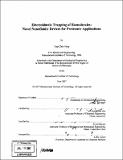Electrokinetic trapping of biomolecules : novel nanofluidic devices for proteomic applications
Author(s)
Wang, Ying-Chih, 1977-
DownloadFull printable version (34.31Mb)
Other Contributors
Massachusetts Institute of Technology. Dept. of Mechanical Engineering.
Advisor
Jongyoon Han.
Terms of use
Metadata
Show full item recordAbstract
Sample preparation has long been the most important and costly process in bioanalyses. Conventional identification methods involve multiple purification steps combined with mass spectrometry or immunosensing. While well-developed and widely utilized, these methods require extensive human labor and exhibit limited resolving power for low abundance analytes. Due to the shear complexity and abundance variation of biosamples, rapid and ultra-sensitive diagnostic measurements of disease markers are still out of reach. To address this issue, we developed a novel nanofluidic concentrator, utilizing the unique concentration polarization effect of sub 50 nm nanofluidic filters. With the distinct ionic and molecular interaction at the nanoscale, nanofluidic systems can potentially outperform current sample preparation and molecular detection techniques. Aiming to investigate and expand the applications of these techniques, this thesis work involves the design and development of a highly efficient nanofluidic preconcentrator, which can achieve a million fold detectability enhancements without complex buffer arrangements. This thesis also includes an integrated preconcentration-immunosensing device. (cont.) By manipulating analyte concentrations, this integrated device not only increases the detection sensitivity, but also expands the dynamic range of given antibody-antigen couples. In addition, we also investigated the ion transfer at the micro-/nano-fluidic interface. Depending on the strength of the applied electric field across the nanochannel array, various phenomena such as concentration polarization, charge depletion, and nonlinear electrokinetic flows in the adjacent microfluidic channel can be observed and studied in situ by fluorescent microscopy. In summary, the nanofluidic concentrator we developed in this thesis facilitates sample preparation and detection of biomolecules from complex biological matrices and facilitates a further understanding of nanoscale molecular/fluid/ion transport phenomena by providing a well-controlled experimental platform.
Description
Thesis (Ph. D.)--Massachusetts Institute of Technology, Dept. of Mechanical Engineering, 2007. Includes bibliographical references (p. 135-141).
Date issued
2007Department
Massachusetts Institute of Technology. Department of Mechanical EngineeringPublisher
Massachusetts Institute of Technology
Keywords
Mechanical Engineering.